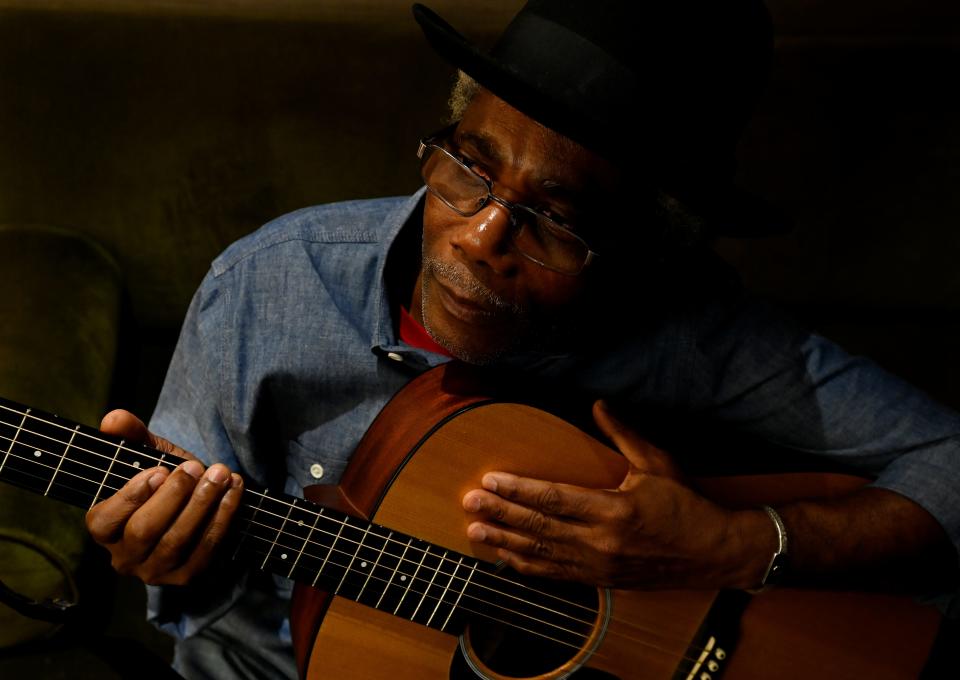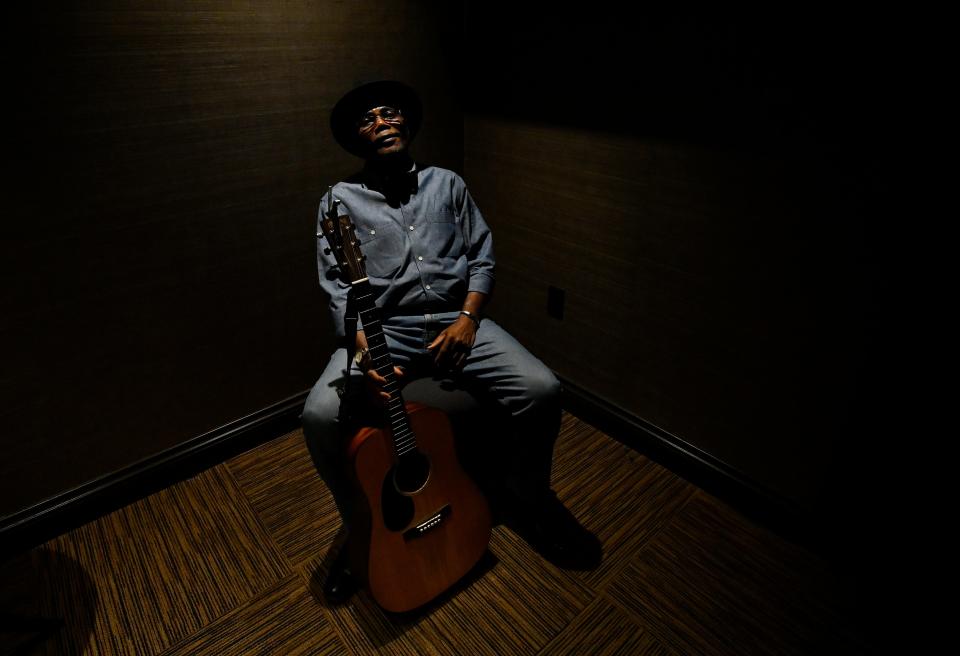Country-folk artist Peter One's journey from stardom to anonymity and back again
- Oops!Something went wrong.Please try again later.
- Oops!Something went wrong.Please try again later.
- Oops!Something went wrong.Please try again later.
- Oops!Something went wrong.Please try again later.
"My songs spark a sincere love of music by universally touching hearts and souls," world-renowned country and folk artist Peter One says in a dressing room two hours before making his Grand Ole Opry debut on a warm Friday evening in April.
The Ivory Coast-born artist is 67 and has listened to American music for most of his life. But only a half-decade ago, he learned that the Opry was a destination point for iconic singers and songwriters of the music that has fostered his lifelong love of vocal harmony-driven acoustic guitar music.
"If [Old Crow Medicine Show vocalist] Ketch Secor didn't tell me about the Grand Ole Opry, I would've only thought it was a building next to Opry Mills Mall," One jokes.

On Friday, his solo debut album, "Come Back to Me," arrives via Verve Records.
The release should herald the revival of a stunning artistic era.
Instead, it's an album made by a former African pop-star-turned nurse who has lived anonymously in Nashville for nearly three decades. An unexpected resurgence in the past five years has seen him make his Opry debut. He has also played gigs at the Ryman Auditorium opening for Jason Isbell, and has forthcoming performances planned at Willie Nelson's Luck Reunion, plus the Big Ears and Newport Folk festivals.
Two years after Charley Pride's No.1 country single "Night Moves" in 1983, One, alongside his collaborator Jess Sah Bi, achieved breakout star status in Ivory Coast on their debut country-folk album "Our Garden Needs Its Flowers."
Simultaneously 5,000 miles away in Johannesburg, Paul Simon was coupling his love of rural Zulu rhythms, zydeco, pop and western punk while recording his Grammy-winning album "Graceland."
"With his characteristic refinement, Mr. Simon has fashioned that event into the rock album equivalent of a work of literature," Stephen Holden stated in The New York Times.
As a continent, Africa encompasses 11 million square miles. Thus, it would stand to reason that a moment wherein Simon's work with South African Zulus to the south, One and Bi in the middle of the continent and Nigerian-born bandleader Fela Kuti's Egypt 80, which highlighted North African influences, could've easily overwhelmed the American marketplace while attempting to navigate the synergy between Black and white listeners.
"I was making French and English language vocal-driven music that was well-respected by — and directly marketed to — wealthy, upper-class people," says One. "In that era, calling music 'country' music played well alongside danceable, beat-driven 'street' music in popularity."
One's tie to Simon's music — and the potential that could've held in the U.S. marketplace in the mid-1980s — is notable. He cites albums like Simon and Garfunkel's "Bridge Over Troubled Water" (released in 1970 when he was a 14-year-old) as inspiring his interest in Cat Stevens, Crosby, Stills, Nash and Young and Creedence Clearwater Revival's "Willy and the Poor Boys" album. That led him to Kenny Rogers and Dolly Parton's pop classic "Islands in the Stream" and Don Williams' No. 1 country album "Cafe Carolina," featuring the No. 1 hit "That's the Thing About Love."
Imagine if four decades ago, following the Grand Ole Opry's 1983 anniversary celebration that featured Ray Charles and Pride appearing on the same weekend, a moment similar to the present era, when 17 Black artists have made their debuts on the country music industry stage between 2020-2022, had occurred — and involved a global slate of African and African-American performers.
Paul Simon's album sales were massive, and Kuti played at Giants Stadium in 1986 — the notion is entirely possible.
However, that did not occur.
Four years elapsed between "Graceland" and Simon's 1990 follow-up "The Rhythm of the Saints," which focused on Brazilian influences. Also, Kuti's album output slowed significantly by the end of the decade.
By 1990, though, Peter One was a superstar in Ivory Coast and much of central Africa.

However, his home nation was caught in the throes of a recession, drought, heightened unemployment and social unrest.
One emigrated to the United States in the early 1990s, eventually settling in Nashville.
Finding it difficult to survive economically in America, he shelved his musical aspirations and became a nurse instead.
Longtime One supporter Brian Shimkovitz — of the blog-turned-independent record label "Awesome Tapes From Africa" — is how One was "rediscovered" in 2018 via a re-release of his 1985 album.
In a press release from the era, Shimkovitz highlights Bi and One's "tranquil vibe and twangy, acoustic guitar-driven instrumentation," plus "soft vocal harmonies."
Five years after that re-release, Isbell had the One open for him on a few dates, including one night at his yearly Ryman residency in 2022.
About One, Isbell notes the following:
"[Peter One sings] something he really means ... he's extremely comfortable; he's in control of the room; he's in control of the dynamics; and you feel like you're seeing somebody who is a legendary singer."
One says this about his forthcoming solo debut release "Come Back To Me":
"You know, some scientists, or philosophers, or psychologists say that as humans we live several lives, and maybe in a previous life I came across this kind of music. After all of this time, I finally see who I am, in total — and now I'm making my way."
He smiles broadly upon making the point.
Clearly, the album reflects him finally achieving the American success he believed himself capable of three decades prior.
Album singles "Cherie Vico" and the Allison Russell collaboration "Birds Go Die Out of Sight (Don't Go Home)," which tells the "complex, sad and true" story of yearning to return home as an immigrant, are already available.
The album track "Staring Into the Blues" is a refreshing funk blast bearing influences of One's Creedence Clearwater Revival-loving past, plus his desire to evolve his compositional skill past the music he recorded 40 years ago.
More music: Sheryl Crow and Willie Nelson are headed to the Rock & Roll Hall of Fame
May concerts: 10 must-see concerts in Nashville this month: Taylor Swift, Billy Joel and more
"Mixing blues and pop with an African flavor" is how One describes the track's polyrhythmic beats and syncopated melodies.
"What am I doing to make this music new in this era?" One says. "Of course, these musical styles are rooted in African traditions, but how can I make this music personal to who I am right now?"
When asked his expectations for what the album can accomplish, the veneer of humility that one would expect from the near 70-year-old performer with his astonishing career story suddenly drops. He's still a proud, robust creator, still desiring to be a leading artistic force.
"Africa's musical riches deserve always to be showcased to the world and I'm excited to be a part of moving that forward," he says. "I want Academy of Country Music awards, Americana Music awards, Country Music Association awards, every award."
This article originally appeared on Nashville Tennessean: Country-folk artist Peter One releases solo album 'Come Back to Me'

